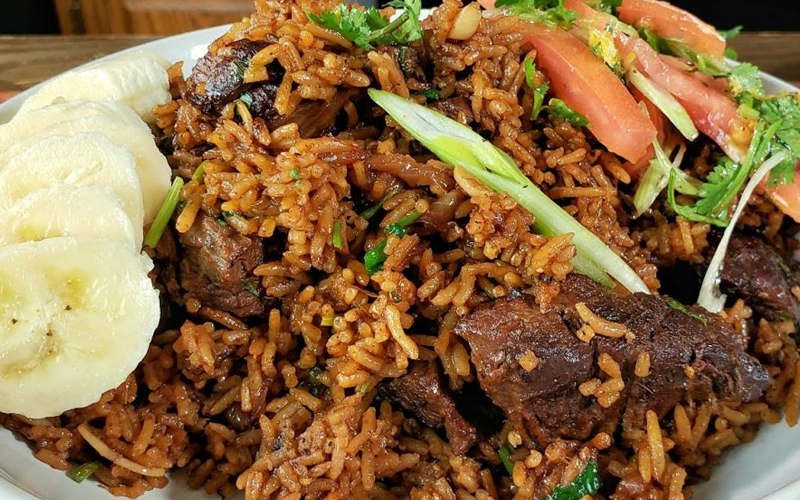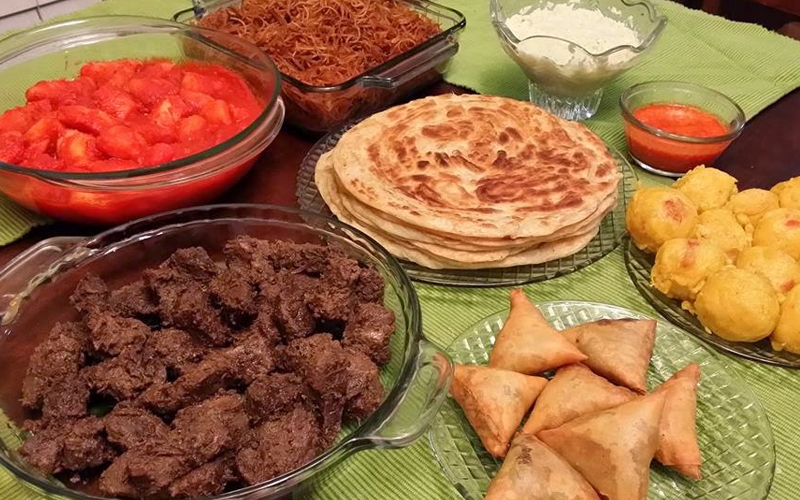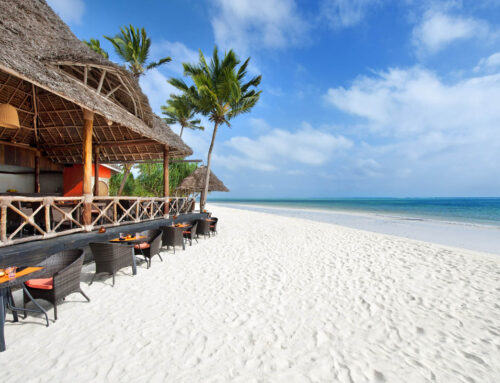Zanzibar, often referred to as the “Spice Island,” is a culinary paradise that offers a unique blend of African, Arab, Indian, and European flavors. The island’s rich history and diverse cultural influences are reflected in its vibrant and aromatic cuisine. From street food delights to sophisticated seafood dishes, Zanzibar’s culinary scene is a feast for the senses. In this guide, we’ll explore the must-try dishes and culinary experiences that will make your visit to Zanzibar unforgettable.
Historical Influences on Zanzibari Cuisine
- Arab and Persian Influence: The Arab and Persian traders who settled in Zanzibar brought with them a variety of spices, cooking techniques, and recipes. This influence is evident in the use of cloves, cinnamon, cardamom, and nutmeg, which are staple ingredients in many Zanzibari dishes. The introduction of these spices not only enhanced the flavor profiles of local dishes but also contributed to the island’s economic growth, as Zanzibar became a major exporter of spices. Traditional Arab and Persian cooking methods, such as slow-cooking meats and combining sweet and savory elements, have been integrated into the local cuisine, creating a rich tapestry of flavors that is uniquely Zanzibari.
- Indian Influence: Indian laborers and traders also played a significant role in shaping Zanzibar’s culinary landscape. The use of curries, biryanis, and chapatis in local cuisine reflects this influence, adding a rich and spicy dimension to the island’s food. Indian spices such as turmeric, cumin, and coriander are commonly used, infusing dishes with their distinctive aromas and tastes. The preparation of intricate rice dishes like biryani, which involves layering rice with meat and spices, showcases the meticulous cooking techniques brought by Indian settlers. This blend of Indian culinary practices with local ingredients has resulted in a variety of dishes that are both comforting and exotic, appealing to locals and visitors alike.
- African Influence: The indigenous African culture of Zanzibar contributes staples like coconut, cassava, and plantains to the local diet. Traditional cooking methods, such as grilling and steaming, are commonly used, emphasizing the natural flavors of the ingredients. Coconut milk, in particular, is a key component in many dishes, providing a rich and creamy base that balances the heat from spices. Plantains and cassava are often prepared in simple yet delicious ways, such as frying or boiling, and are served alongside main dishes to complement the robust flavors. This seamless blend of African culinary traditions with the island’s multicultural influences results in a unique and diverse food scene that celebrates Zanzibar’s heritage.
Must-Try Dishes in Zanzibar
- Zanzibar Pizza: A popular street food found in Forodhani Night Market, Zanzibar Pizza is a unique twist on the traditional pizza. It features a thin dough filled with a mix of ingredients like minced meat, onions, peppers, cheese, and an egg, folded and fried on a hot griddle. This delightful snack is not only delicious but also represents the fusion of different culinary traditions that characterize Zanzibari cuisine. The crispy, golden-brown exterior encases a flavorful filling, creating a perfect balance of textures and tastes. Enjoying a Zanzibar pizza while strolling through the bustling night market, with the aroma of grilled seafood and spices in the air, is an experience that encapsulates the vibrant spirit of Stone Town.
- Biryani and Pilau: Biryani and Pilau are flavorful rice dishes influenced by Indian cuisine. Biryani is made with fragrant basmati rice, meat (usually chicken or goat), and a blend of spices, while Pilau is a simpler, spiced rice dish often served with vegetables and meat. These dishes are typically cooked using a method that allows the rice to absorb the rich flavors of the spices and meat, resulting in a dish that is aromatic and deeply satisfying. Biryani, with its layers of spiced rice and tender meat, is often reserved for special occasions and celebrations, while Pilau is a staple in everyday meals. Both dishes reflect the intricate cooking techniques and rich spice blends that are a hallmark of Zanzibari cuisine.
- Seafood Delicacies: Being an island, Zanzibar boasts an abundance of fresh seafood. Grilled fish, prawns, calamari, and octopus are commonly served with a side of spicy sauces and coconut rice. The seafood is often caught daily by local fishermen, ensuring its freshness and flavor. Grilling is a popular cooking method that enhances the natural taste of the seafood, while spicy sauces, made with ingredients like chili, garlic, and lime, add a zesty kick. Coconut rice, with its creamy texture and subtle sweetness, pairs perfectly with the savory seafood, creating a harmonious balance of flavors. Dining on fresh seafood at a beachfront restaurant, with the sound of waves in the background, is one of the quintessential experiences of visiting Zanzibar.
- Urojo Soup (Zanzibar Mix): Urojo, also known as Zanzibar Mix, is a tangy and spicy soup made with a base of chickpea flour, potatoes, and a variety of toppings such as fritters, boiled eggs, and raw mango slices. It’s a popular street food that offers a burst of flavors and textures in every bite. The soup is typically thickened with chickpea flour, giving it a rich and creamy consistency, while the addition of potatoes and fritters adds heartiness. The raw mango slices provide a refreshing tartness that balances the spiciness of the soup. Urojo is often enjoyed as a snack or a light meal, and its vibrant flavors make it a favorite among locals and visitors alike.
- Zanzibari Coconut Curry: Zanzibari coconut curry is a creamy, aromatic dish made with coconut milk, a blend of spices, and your choice of meat or vegetables. It’s usually served with rice or chapati, a type of flatbread. The coconut milk provides a rich and velvety base for the curry, while the spices, such as turmeric, cumin, and coriander, add depth and complexity to the flavor. The choice of meat or vegetables allows for versatility, with options ranging from tender chicken or fish to hearty vegetables like eggplant and sweet potatoes. The curry is typically slow-cooked, allowing the flavors to meld together beautifully. Served with fluffy rice or warm chapati, Zanzibari coconut curry is a comforting and satisfying dish that showcases the island’s culinary prowess.
Sweet Treats and Desserts
- Mandazi: Mandazi are East African doughnuts, slightly sweet and flavored with coconut milk. They are perfect for breakfast or as a snack, often enjoyed with a cup of chai. The dough is typically made with a mixture of flour, sugar, and coconut milk, giving the mandazi a light and airy texture with a hint of sweetness. They are deep-fried until golden brown and crispy on the outside while remaining soft and fluffy on the inside. Mandazi can be enjoyed plain or dusted with powdered sugar, and they pair perfectly with a steaming cup of chai or coffee. These delightful treats are a popular snack in Zanzibar and are often sold by street vendors and local bakeries.
- Halwa: Zanzibari halwa is a sweet, sticky dessert made from sugar, ghee, and various spices like cardamom and nutmeg. It has a rich, gelatinous texture and is often served on special occasions. The preparation of halwa involves cooking the ingredients over low heat for several hours, allowing the mixture to thicken and develop its characteristic texture. The addition of spices gives the halwa a warm and aromatic flavor that is both comforting and indulgent. Halwa is traditionally cut into small squares or slices and is enjoyed as a sweet treat after meals. Its unique texture and rich flavor make it a beloved dessert in Zanzibar.
Unique Culinary Experiences
- Spice Tours: Spice tours are a popular activity in Zanzibar, offering a chance to visit spice farms and learn about the island’s spice production. You’ll get to see, smell, and taste a variety of spices and herbs, and learn how they are used in local cuisine. The tours often include a walk through lush plantations where you can observe the growing and harvesting processes of spices such as cloves, cinnamon, and vanilla. Knowledgeable guides provide insights into the historical and cultural significance of these spices, as well as their culinary uses. Spice tours often conclude with a tasting session, allowing you to sample dishes and drinks made with fresh spices. This immersive experience provides a deeper understanding of Zanzibar’s culinary heritage and the vital role that spices play in its cuisine.
- Cooking Classes: Taking a cooking class in Zanzibar is a fantastic way to immerse yourself in the local culture and learn to prepare traditional dishes. You’ll typically visit a market to buy ingredients before cooking and enjoying a meal. These classes offer hands-on instruction from local chefs who share their knowledge and techniques for creating authentic Zanzibari dishes. From learning how to make intricate spice blends to mastering the art of cooking coconut curry, these classes provide valuable insights into the island’s culinary traditions. The experience often includes a communal meal where you can savor the dishes you’ve prepared, making it a rewarding and memorable activity.
- Forodhani Night Market: Forodhani Night Market in Stone Town is a bustling food market that comes alive in the evening. It’s a great place to sample a wide variety of local dishes and street food, from seafood skewers to Zanzibar pizza. The market is a vibrant hub of activity, with vendors grilling seafood, preparing fresh fruit juices, and frying up delectable snacks. The aroma of spices and grilled meat fills the air, creating an enticing atmosphere that draws visitors from near and far. The market’s waterfront location adds to its charm, providing stunning views of the Indian Ocean as you dine on delicious street food. Forodhani Night Market is not just a place to eat; it’s a cultural experience that showcases the diversity and vibrancy of Zanzibar’s culinary scene. Exploring the stalls and interacting with the local vendors allows you to discover new flavors and ingredients while immersing yourself in the lively atmosphere of Stone Town.
Zanzibar’s culinary scene is as diverse and vibrant as its culture and history. From the aromatic spice tours to the bustling Forodhani Night Market, there’s a culinary adventure waiting at every corner. Whether you’re a fan of seafood, spices, or sweets, Zanzibar offers a taste experience that is sure to delight your senses and leave you with lasting memories. Exploring the local cuisine is not just about food; it’s about immersing yourself in the island’s rich cultural tapestry. With influences from Arab, Indian, African, and European cuisines, Zanzibar’s culinary heritage is a true reflection of its melting pot of cultures.
FAQs
What are the must-try dishes in Zanzibar?
Must-try dishes include Zanzibar pizza, biryani, pilau, seafood delicacies, Rojo soup, and Zanzibari coconut curry. For desserts, try mandazi and halwa.
Where can I experience the best street food in Zanzibar?
The Forodhani Night Market in Stone Town is the best place to experience a wide variety of street food, including Zanzibar pizza, seafood skewers, and sugarcane juice.
What is unique about Zanzibari cuisine?
Zanzibari cuisine is unique due to its blend of African, Arab, Indian, and European influences, creating a rich and diverse culinary landscape with an emphasis on spices and fresh ingredients.
Can I take cooking classes in Zanzibar?
Yes, many hotels and tour operators offer cooking classes where you can learn to prepare traditional Zanzibari dishes. Emerson on Hurumzi and Tangawizi Bistro are notable options.
What should I expect on a spice tour in Zanzibar?
On a spice tour, you can expect to visit spice farms, learn about the cultivation and uses of various spices, and enjoy tasting fresh spices and fruits. It’s an educational and sensory experience that provides insight into Zanzibar’s spice production.
For comprehensive information on Tanzania’s stunning national parks and the Ngorongoro Crater, explore the following topics on our page:
– Ngorongoro Crater
– Kilimanjaro National Park
– Mikumi National Park
– Tarangire National Park
Discover detailed insights and tips to plan your visit and enjoy an unforgettable adventure in these remarkable destinations.







Leave A Comment